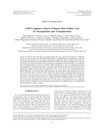 15 citations,
May 2004 in “Facial Plastic Surgery Clinics of North America”
15 citations,
May 2004 in “Facial Plastic Surgery Clinics of North America” The document concludes that while "hair follicle cloning" shows promise for unlimited donor hair, it faces challenges with consistency and safety in humans.
 April 2023 in “Journal of Cutaneous and Aesthetic Surgery”
April 2023 in “Journal of Cutaneous and Aesthetic Surgery” Using different hair loss treatments at various times can improve results and reduce side effects for people with chronic hair loss.
[object Object]  29 citations,
December 2019 in “Stem Cells Translational Medicine”
29 citations,
December 2019 in “Stem Cells Translational Medicine” Fully regenerating human hair follicles not yet achieved.
 2 citations,
March 2013 in “Hair transplant forum international”
2 citations,
March 2013 in “Hair transplant forum international” Research on "hair cloning" for hair loss shows potential for hair thickening but has not yet achieved new hair growth in humans.
October 2015 in “CRC Press eBooks” Hair cloning for hair loss is not yet a practical solution.
 7 citations,
October 2011 in “International Surgery”
7 citations,
October 2011 in “International Surgery” In 2011, hair restoration was a specialized field in plastic surgery, using techniques like "Ultrarefined follicular unit hair transplantation" to minimize scarring and promote hair growth, with future treatments like stem cell therapy and hair cloning still being tested.

Human hair follicle cells can be turned into stem cells that may help clone hair for treating hair loss or burns.
18 citations,
November 2016 in “PeerJ” Human hair follicles can be used to create stem cells that might help clone hair for treating hair loss or helping burn patients.
 6 citations,
July 2013 in “Molecular Imaging”
6 citations,
July 2013 in “Molecular Imaging” The technique allowed noninvasive tracking of hair stem cell survival and growth, showing potential for hair loss research.
June 2024 in “Regenerative Therapy” iPSCs show promise for hair regeneration but need more research to improve reliability and effectiveness.
 27 citations,
September 2018 in “Nanomedicine: Nanotechnology, Biology and Medicine”
27 citations,
September 2018 in “Nanomedicine: Nanotechnology, Biology and Medicine” Further research is needed to improve hair regeneration using stem cells and nanomaterials.
 26 citations,
January 2007 in “Organogenesis”
26 citations,
January 2007 in “Organogenesis” Bioengineering can potentially treat hair loss by regenerating hair follicles and cloning hair, but the process is complex and needs more research.
 7 citations,
March 2017 in “Actas Dermo-Sifiliográficas”
7 citations,
March 2017 in “Actas Dermo-Sifiliográficas” Several new treatments for different types of hair loss show promise in improving patient quality of life.
Current hair regeneration methods show promise but face challenges in maintaining cell effectiveness and creating the right environment for hair growth.
[object Object]  November 2015 in “Hair transplant forum international”
November 2015 in “Hair transplant forum international” Early attempts at using cloned cells for hair transplants failed, but 3D cell growth showed some promise.
 November 2023 in “International Journal of Medical Sciences”
November 2023 in “International Journal of Medical Sciences” New regenerative medicine-based therapies for hair loss look promising but need more clinical validation.
 4 citations,
January 2022 in “Life”
4 citations,
January 2022 in “Life” Tissue engineering could be a future solution for hair loss, but it's currently expensive, complex, and hard to apply in real-world treatments.
 42 citations,
February 2021 in “Signal Transduction and Targeted Therapy”
42 citations,
February 2021 in “Signal Transduction and Targeted Therapy” Hair follicle regeneration possible, more research needed.
 13 citations,
May 2005 in “Seminars in Plastic Surgery”
13 citations,
May 2005 in “Seminars in Plastic Surgery” Follicular Cell Implantation might become a new treatment for hair loss and could lead to advances in organ regeneration.
 16 citations,
June 2021 in “Journal of Dermatological Treatment”
16 citations,
June 2021 in “Journal of Dermatological Treatment” Minoxidil effectively treats hair loss, especially androgenetic alopecia, but needs more research for better understanding.
 4 citations,
April 2012 in “Asian-australasian Journal of Animal Sciences”
4 citations,
April 2012 in “Asian-australasian Journal of Animal Sciences” Red deer antler extract may help hair grow faster by increasing a growth protein.
 136 citations,
May 2019 in “Cells”
136 citations,
May 2019 in “Cells” Stem cell therapy, particularly using certain types of cells, shows promise for treating hair loss by stimulating hair growth and development, but more extensive trials are needed to confirm these findings.
 21 citations,
October 2009 in “Biochemical Engineering Journal”
21 citations,
October 2009 in “Biochemical Engineering Journal” Stem cell therapy is a promising approach for hair regrowth despite potential side effects.
 September 2017 in “Springer eBooks”
September 2017 in “Springer eBooks” Stem cells show promise for hair loss treatment, but no effective product for hair regeneration has been developed yet.
 1 citations,
January 2019 in “Journal of Dermatology and Dermatologic Surgery”
1 citations,
January 2019 in “Journal of Dermatology and Dermatologic Surgery” Stem cell therapy shows promise for hair loss treatment, but more research is needed to confirm its effectiveness.
 8 citations,
January 2015 in “Journal of Cutaneous Medicine and Surgery”
8 citations,
January 2015 in “Journal of Cutaneous Medicine and Surgery” Hair restoration techniques have improved but still rely on limited donor hair, with new methods like cloning and gene therapy being explored.
 10 citations,
December 2011 in “Cell Transplantation”
10 citations,
December 2011 in “Cell Transplantation” Researchers successfully grew human hair follicle cells that could potentially lead to new hair loss treatments.
 88 citations,
July 2019 in “International Journal of Molecular Sciences”
88 citations,
July 2019 in “International Journal of Molecular Sciences” Using human fat tissue derived stem cells in micrografts can safely and effectively increase hair density in people with hair loss.
 January 2016 in “Elsevier eBooks”
January 2016 in “Elsevier eBooks” The conclusion is that grasping how cells determine their roles through evolution is key, with expected progress from new research models and genome editing.
 April 2012 in “Annals of Neurosciences”
April 2012 in “Annals of Neurosciences” The document concludes that stem cell therapies lack solid proof of effectiveness, except for blood system treatments, and criticizes the ethical issues and commercial exploitation in the field.


























